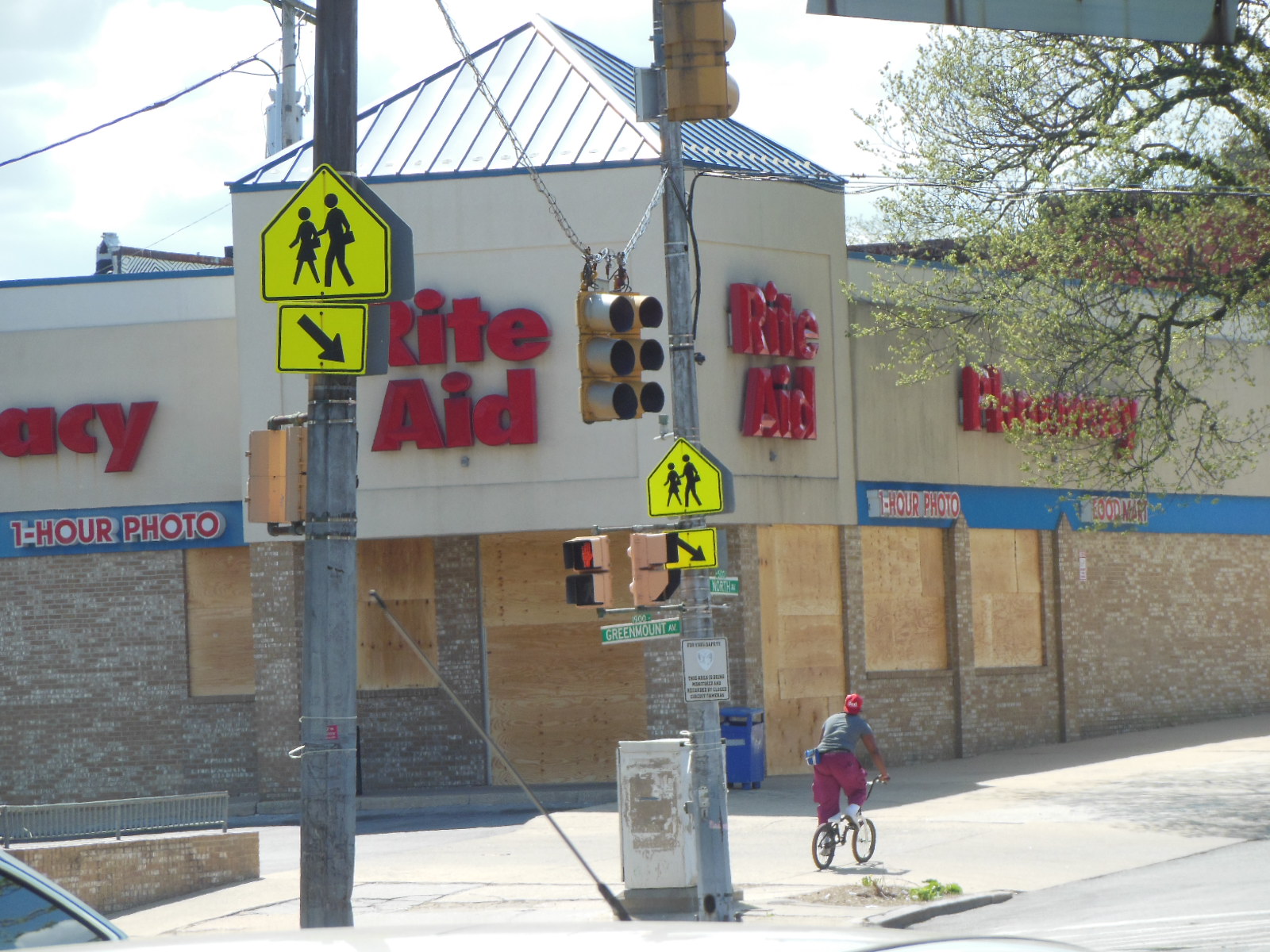Baltimore Riots: Businesses will help rebuild city
The Rite Aid Pharmacy on North Avenue was just one of the targets of the looters. (Anthony C. Hayes)
By Len Lazarick
The 60th anniversary annual meeting of the Greater Baltimore Committee Monday night was more resolute than joyous, as business leaders promised to focus on rebuilding and restoring a city whose long-simmering boiled into looting and arson covered in national and international media.
“We have to try some different things in Baltimore,” said Brian Roberts, chairman of T. Rowe Price, the large mutual fund company, and retiring chairman of the GBC. “There will need to be hard work to overcome the images of Baltimore” from the days of unrest, such as the photo of the baseball game played in an any empty Orioles Park that ran on the front page of the Financial Times of London. (A similar image was a two-page spread in Time magazine.)
Incoming GBC chairman David Warnock, managing partner of the investment firm Camden Partners, said, “Much rebuilding needs to begin but most of it is in the area of trust. The breach in our collective confidence that we can tackle the serious inequities and poverty that plague our city is real and will only be overcome with leadership and collaboration at all levels.”
The crowd of about 700 at the dinner at the Baltimore Hilton that backs up to Orioles Park included some of the top business and political leaders of the region, including Mayor Stephanie Rawlings-Blake. (The stadium was only half filled for what was billed as “reopening day.”)
Those at the dinner reaffirmed their own commitment to Baltimore by pledging over $150,000 in less than two hours via text message during the course of the dinner. That will be matched by $50,000 from GBC and go to a Baltimore Business Recovery Fund to aid businesses damaged in the rioting with limited or no insurance.
Associated with major building projects
Ironically, the Greater Baltimore Committee was founded in 1955 when Baltimore had reached the peak of it population at nearly 950,000 people. Population has dropped by a third over the six decades and is now at 623,000.
The GBC is associated with helping lead or promote some of the major physical enhancements that have become the image of Baltimore to the world — the Inner Harbor, the National Aquarium, the convention center and the two downtown stadiums.
GBC was one of the first and most consistent advocates of building mass transit in Baltimore from the subway to light rail. It is now an ardent proponent of building the east-west Red Line in the city, a prospect applauded several times at Monday’s dinner.
“In the wake of Freddie Gray, is there a bigger near term job stimulus program than kicking off the Red Line?” Warnock asked.
Turning to human capital
In the last 15 years, the GBC has turned from capital projects to more of the human capital in Baltimore, especially after the recent protests and violence.
“How do we heal?” asked Don Fry, GBC president for the past 15 years.
“First we must work together to restore city neighborhoods — not just the businesses in the neighborhoods, but the people and the neighborhoods.”
“There is clearly much work to be done to address long-simmering issues that require serious attention, not just to get beyond the recent violence, but to resolve important and economic and quality of life challenges.”
The GBC plans to enlarge an already existing major program called Bridge the Gap, aimed at helping women- and minority-owned businesses, Fray said. He also chairs the Hire One Youth program, to give jobs to teenagers. At the event where she was praised for her handling of the disturbances, Mayor Stephanie Rawlings-Blake suggested this summer it become the “Hire Two” youths program.
Help for ex-convicts, praise for police
Warnock urged changes in state law and policy that would make it easier for those charged with crimes and not convicted, or those released from prison to get jobs.
Yet Warnock also praised the Baltimore police, which drew applause from the dinner audience, and for State’s Attorney Marilyn Mosby who is prosecuting the police in the death of Freddie Gray.
Fry admitted that Baltimore’s forward momentum, which includes a influx of millenials living in downtown, “has been paused, and is potentially a setback.”
But, he said, “We’re going to continue to play a leadership role.”
“This isn’t first time seeds of real change are sown in a time of trouble,” said Warnock. “This is not the first wakeup call, but it’s the one this generation needs to answer.”

MarylandReporter.com is a daily news website produced by journalists committed to making state government as open, transparent, accountable and responsive as possible – in deed, not just in promise. We believe the people who pay for this government are entitled to have their money spent in an efficient and effective way, and that they are entitled to keep as much of their hard-earned dollars as they possibly can.

